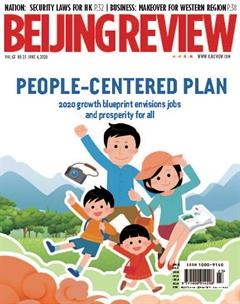A New Blueprint
The Two Sessions, the annual meetings of the national legislature and the top political advisory body, rescheduled to the end of May and with their duration halved due to the novel coronavirus pandemic, were especially signifi cant this year.
While the world has long focused attention on Chinas economic policies, the pandemic has drawn more eyes onto them.
Because of uncertainties caused by the pandemic, no specific target for economic growth was announced at the meetings, unlike in other years. Although the disease is under control in China and some other countries are also resuming work and production, uncertainties will continue.
Chinas focus is to balance epidemic containment with economic and social development.
This year, the government will give priority to stabilizing employment, ensuring living standards, eradicating absolute poverty and completing building a moderately prosperous society in all respects.
Last year the world economy saw the slowest economic growth since the 2008 financial crisis. However, amid rising international economic and trade frictions, China registered a GDP growth rate of 6.1 percent, with its economic aggregate reaching 99.1 trillion yuan ($13.8 trillion) and 13 million new jobs created. This is a hard-won feat.
The fourth quarter of 2019 saw an upturn in the Chinese economy. However, the economy contracted in the first quarter of this year after the novel coronavirus epidem- ic struck. With production and work mostly resumed, the economic growth is picking up.
The government work report says China will add more than 9 million urban jobs and keep the surveyed urban unemployment rate at around 6 percent.
Not setting a specific target for economic growth is to enable the country to concentrate on ensuring stability of employment, the financial sector, foreign trade, foreign investment, domestic investment and market expectations. It will also focus on guaranteeing employment and basic living standards, protecting market entities, maintaining food and energy security, securing industrial and supply chains, and ensuring public services at the community level.
This year, China will also boost domestic demand to drive its economic growth mainly through deepening supply-side structural reform.
It will increase investment in new infrastructure, new-type urbanization and major projects in such traditional fi elds as transportation and water conservancy to promote quality economic development.
It will pump more money into social and economic development. The Central Government will add 1 trillion yuan ($140 billion) to its fi scal defi cit, and issue 1 trillion yuan of government bonds for epidemic control. Local governments will issue 3.75 trillion yuan ($523 billion) worth of special bonds.
If all these plans are implemented, the growth in 2020 will beat the expectations of global fi nancial organizations.

